Live on the homepage now!
Reader Supported News
House seats are on the line as progressives challenge incumbents in a string of contested Democratic primaries, part of a broader struggle over the party’s future
Jeffries and two of his House Democrat allies on Wednesday rolled out the first slate of endorsements from Team Blue PAC, a political action committee intended to protect incumbents from intraparty attacks. The endorsements and their attendant $5,000 campaign contributions are the strongest demonstration of support yet from Jeffries and his allies — and serve as a warning shot to primary challengers seeking to unseat incumbents as Democrats fight to hold onto their fragile majorities.
“It’s important to support effective legislators for delivering for the American people in partnership with the Biden administration,” Jeffries says. “We want to support common-sense members who are delivering for their districts and helping advance the Democratic agenda to create jobs and cut costs for their constituents,” adds Rep. Josh Gottheimer (D-N.J.), another Team Blue PAC co-founder.
The primary challengers and their allies see things differently — and think Jeffries and his allies should take a different tack in protecting their majority. “It is extremely alarming that critical resources from Democratic Party leadership are going to protect incumbents from having to face any competition in deep-blue districts instead of protecting the swing seats we’re in danger of losing in November,” says Waleed Shahid, the communications director of Justice Democrats, the left-wing group that supported Rep. Alexandria Ocasio-Cortez (D-N.Y.) and other successful progressives in their House primary runs.
These primary endorsements are the latest front in the fight over the future of the Democratic Party. The struggle experienced a brief armistice last year as Congress’s left flank worked closely with the White House and Democratic leadership to push the Build Back Better Act, the Democrats’ sweeping domestic agenda, over the finish line. The bill passed the House with nearly unanimous Democratic support, but stalled in the Senate, heightening an already-present conflict. Now that primary season is here, House seats and political power are on the line.
Team Blue is on one side of this conflict. Jeffries launched the effort with Gottheimer and Rep. Terri Sewell (D-Ala.) last June. The trio is not a monolith: Jeffries is a member of the Congressional Progressive Caucus, while Gottheimer and Sewell are members of the business-friendly Democratic coalitions. Sewell and Jeffries are also members of the Congressional Black Caucus, which has taken umbrage to primary threats mounted against its members.
The lawmakers united in an effort to provide resources to the increasing number of House Democrats who face primary challenges — in particular, from the left. That circumstance faces the five incumbents who received endorsements on Wednesday: Reps. Shontel Brown (D-Ohio), Danny Davis (D-Ill.), Carolyn Maloney (D-N.Y.), Donald Payne Jr. (D-N.J.), and Dina Titus (D-Nev.). Davis and Maloney face opponents backed by Justice Democrats; Brown faces a rematch from Bernie Sanders ally Nina Turner, who had the support of the left-wing group during a special election to fill the seat last year.
Jeffries says he doesn’t object to primary challenges — he launched one himself on the way to winning his Brooklyn-based House seat. And he insists the PAC’s efforts are not strictly a matter of ideology: Maloney is a member of the Congressional Progressive Caucus, just like he is. Its purpose, Jeffries says, is to protect incumbents’ records from “being distorted” by “the hard-left.” He uses the term to separate himself from his detractors, who see actions like these endorsements as evidence he’s not on their side. “Why are members of the hard-left targeting progressive members of Congress, and then trying to act as though they’re engaging in some ideological contest against the rest of us?” Jeffries says. (It’s worth noting, of course, that Team Blue PAC isn’t defending any incumbents from challenges from the right.)
The primary challengers and their allies do not see any distortion. Democrats’ failures to pass their bold agenda, they say, is proof that the party remains tethered to corporate influence and centrist proclivities. Some of that is easily observed in outward positions lawmakers take, such as Sen. Joe Manchin’s (D-W.V.) objections to the Build Back Better Act. But some of it is measured by a lack of vigor — a sense that lawmakers, even if they put their names on the most progressive legislation, roll over toward the moderate mean too easily. “I agree with what Rep. Jeffries said in 2011 after his third primary challenge against an incumbent Democrat: Some incumbents have had decades to make a difference,” says Justice Democrats’ Shahid. “It’s time to move in another direction.”
There’s also the matter of corporate campaign funding, which all of the Team Blue PAC-endorsed candidates accept. The PAC itself is primarily financed through corporate PAC money, and I asked Jeffries whether that fact proves his detractors’ point.
“Is there any evidence that their voting record and advocacy has been influenced by people who have contributed to them?” he says, pointing to their voting records. “Somehow we’re supposed to theoretically believe that they’re being unduly influenced because they’re raising money from employee-supported political action committees.”
Primary challengers dismiss that assessment. “Carolyn Maloney was always going to have the support of the corporate establishment — that’s a given when you’re running for your 15th term in Congress,” Rana Abdelhamid, who’s running against Maloney, said in a statement. “Democratic leadership should be spending every dime of our party’s resources on helping frontline incumbents in swing districts and protecting our majority instead of coming into a deep-blue district that is clamoring for new leadership,” says Kina Collins, who’s challenging Davis.
One notable omission from the PAC’s inaugural slate: Rep. Henry Cuellar (D-Texas), a centrist Democrat facing a primary challenge from immigration attorney Jessica Cisneros. Ocasio-Cortez stumped for Cisneros in Texas last weekend, and upbraided Cuellar for helping to railroad the Democratic agenda — the opposite, in other words, of what Jeffries says Team Blue PAC rewards members for. “No specific reason,” Jeffries says when I ask about Cuellar’s exclusion, noting a desire to “start with a modest list of members who’ve been working hard as part of the team.” Nothing to do with the recent FBI raid on Cuellar’s home and campaign headquarters? “I think people shouldn’t prejudge the outcome of an investigation that hasn’t been completed,” Jeffries replied.
Team Blue PAC’s endorsements arrive at a moment when Democrats have stressed unity as they head into what’s expected to be a challenging midterm election. So far, progressive lawmakers have shied away from endorsing primary challengers: A notable exception is Rep. Cori Bush (D-Mo.), who endorsed Titus challenger Amy Vilela, and the handful of progressive House and Senate Democrats who have endorsed Cisneros.
I ask Jeffries if he likes his colleagues who won their seats in primaries. They’re “an important part of the Democratic caucus family,” he says, “and have added ideas, energy, intellect, and enthusiasm to the team.” Would his group support the likes of Ocasio-Cortez or Bush if they faced a primary threat? “That’s a conversation we would need to have with the other two members of Team Blue PAC,” Jeffries says. “But I personally will continue to be there for any member of the House Democratic Caucus who asked for my support.”
Gottheimer has openly sparred with Ocasio-Cortez, and once referred to her left-flank allies as “the Herbal Tea Party.” But when asked the same question, he echoed Jeffries’ sentiment. “ I can’t speak for Team Blue, and I would have to talk with our co-chairs, but I’m always open to supporting any of my colleagues who want to get things done for their constituents and who ask for our help.”
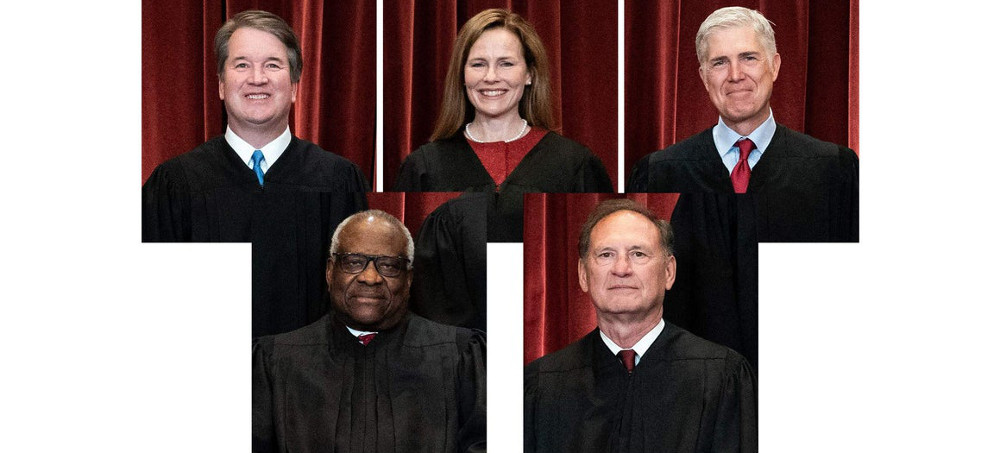 Clockwise from top left: Justices Brett Kavanaugh, Amy Coney Barrett, Neil Gorsuch, Sam Alito, and Clarence Thomas. (photo: Slate)
Clockwise from top left: Justices Brett Kavanaugh, Amy Coney Barrett, Neil Gorsuch, Sam Alito, and Clarence Thomas. (photo: Slate)
Fears about the Supreme Court’s public reputation used to have a moderating influence—but that may not be the case any longer.
What’s to stop a runaway Court? Not impeachment—only one justice has ever been impeached, in 1805, and he was ultimately acquitted. Not long ago, political scientists, historians, and legal scholars argued that the Court would self-moderate to preserve its so-called legitimacy. And that seems to have been right—at least then. In those times, the Court’s decisions generally reflected popular opinion on major issues of the day. And for good reason: Historically, when the Court ignored a national consensus—and seemed indifferent to arguments about legitimacy—the consequences were serious. Congress stripped the Court of jurisdiction and manipulated its size. States defied the Court, and individuals ignored it. Paying attention to concerns about legitimacy, by contrast, has generally allowed the Court to preserve its authority. Since Franklin D. Roosevelt’s plan to pack the Court failed in 1937, resistance to the Court has been more subtle, and the justices have generally tried to avoid decisions that set off a major backlash. At least until recently.
All of this makes it important to understand what we mean when we talk about the legitimacy of the Supreme Court. As the Harvard Law professor Richard Fallon has shown, defining legitimacy takes some work. It can refer to the Court’s moral standing—a concern most acutely raised in legal systems, such as those of Nazi Germany, that sanction obvious human-rights violations. Legitimacy, too, can refer to the perceptions of the legal community—do lawyers, judges, and academics believe that the justices are using reasonable interpretive methods and applying them in good faith? Most often, legitimacy describes the Court’s ability to command the public’s respect and obedience. Whichever definition you use, none seems to have much of a moderating influence on the Court’s conservative majority today.
In the past, the Court has clearly been worried about threats to its legitimacy. In 1992, in declining an invitation to reverse Roe, a plurality worried—in plain text, in their written opinion—that undoing abortion rights “under fire” would irreparably damage the Court, proving to the public that the justices were partisan and undermining respect for the Court in the legal community. At oral argument in Dobbs v. Jackson Women’s Health Organization in December, the liberal justices tried to raise the specter of damage to the Court that might follow the reversal of Roe. Stephen Breyer read passages from Casey suggesting that reversing Roe would hurt the Court’s reputation. “Will this institution survive the stench that this creates in the public perception that the Constitution and its reading are just political acts?” Sonia Sotomayor asked, implying that damage to the Court’s legitimacy could be long-lasting. But these arguments about legitimacy ring hollow, at least for some.
Part of this is that the legal community has changed since 1992. Then, the Federalist Society, only a decade old at the time, was on its way to creating a conservative legal network with a farm team of prospective judicial nominees, a foothold in elite institutions, and an arsenal of effective legal arguments. Today, the Federalist Society is a giant—responsible for reshaping the Supreme Court—with tens of thousands of members, a large budget, and impressive political connections. If the Court reverses Roe, holds affirmative action to be unconstitutional, dramatically expands gun rights, and hamstrings the administrative state—and does so quickly—it will damage its own reputation with the broadly defined legal community. But the Republican Party and the Federalist Society have created a parallel community with its own norms and sources of validation. The justices may not worry about losing legitimacy in one elite legal circle when they will be heroes in another.
The justices seem equally unmoved by the thought of damaging the Court’s legitimacy with the public. The reasons for this are clear. Despite progressives’ anger at the Court and their advocacy for reforming the institution—demanding term limits and the addition of more justices, among other things—the structure of the Senate means that none of these possibilities is a live threat to the justices now, or potentially ever. President Joe Biden’s commission to consider Court reforms did not settle on a solution, much less embrace the idea of adding justices. And the Senate would hardly entertain such an idea even if the commission had pushed it to. With Biden battling low poll numbers and the prospect of a traditional midterm slump, Democrats seem unlikely to gain the votes for Court reform this year.
What about other forms of backlash? Many progressives are holding out hope that if the Court issues unpopular blockbuster decisions on abortion and much more, a political backlash will emerge. But that’s far from guaranteed, especially given the deep polarization plaguing the nation, with a growing number of uncompetitive races, laws that make voting harder, and gerrymandering. Besides, the fact that voters may oppose criminalizing abortion or gutting voting rights does not automatically mean that election results will change. For now, it’s impossible to predict whether there will be a backlash, or what difference it would make.
The Court’s conservatives, at least, don’t seem worried. They are launching a legal revolution, and they don’t seem to think that anything will stop them.
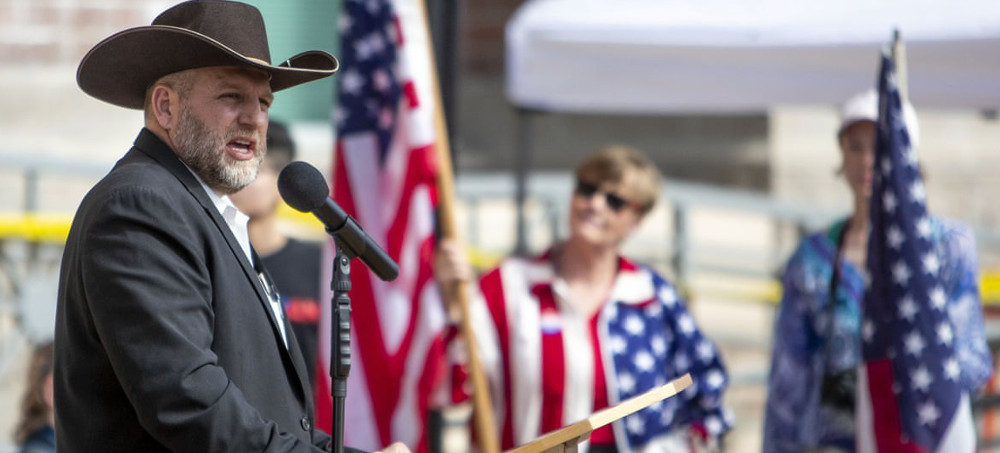 Ammon Bundy speaks to a crowd of about 50 followers in downtown Boise, Idaho, last year. He is running for governor as a Republican. (photo: Darin Oswald/AP)
Ammon Bundy speaks to a crowd of about 50 followers in downtown Boise, Idaho, last year. He is running for governor as a Republican. (photo: Darin Oswald/AP)
Anti-Defamation League list includes at least a dozen with links to white supremacists, anti-government extremists and Proud Boys
Aside from those expressing extremist rhetoric and far-right views, the ADL has found at least a dozen of the candidates had explicit connections to ‘“white supremacists, anti-government extremists and members of the far-right Proud Boys”. It includes primary challengers running to the right of some sitting Republicans.
In Arkansas’s third district Neil Kumar, who the ADL found has written for white supremacist publications, is challenging the incumbent congressman, Steve Womack, who broke with Republicans in voting in favor of creating the January 6 commission to investigate the Capitol attack. The openly racist views of Kumar prompted the Arkansas state Republican party to take the unusual step of declaring him a “non-recommended candidate” in the upcoming primary.
The wave of far-right candidates includes sitting legislators like the Arizona state senator Wendy Rogers, who has admitted to being a member of the Oath Keepers, a far-right militia with 11 members currently under federal indictment for seditious conspiracy.
Other militia groups have candidates running or already in local office. The Washington Three Percent militia claims members in dozens of elected offices throughout the Pacific north-west, the Washington Post found, “including a mayor, a county commissioner and at least five school board seats”.
In Idaho the far-right anti-government activist Ammon Bundy – who led an armed standoff against federal agents at Malheur wildlife refuge in 2014 – is running for the governor’s office. Bundy’s group, the People’s Rights network, has now increased its national membership to 33,000 members and has at least 398 activists in 39 states, according to a report by Institute for Research … Education on Human Rights.
Many far-right candidates have no direct links to violent extremist groups, but do support a range of far-right views. The ADL tracked at least 45 candidates running for office this year that have “lent credence in some way” to the QAnon conspiracy theory movement. Many more hold on to Donald Trump’s “big lie” – the false belief that the 2020 election was stolen.
Nationwide there are 207 current elected officials who aided former president Trump in efforts to overturn the 2020, according to data compiled by the Insurrection Index, a project of the voting rights group Public Wise. The index includes senators like Ron Johnson from Wisconsin, who voted against certifying the 2020 election and spread misinformation including suggesting that the January 6 attack was carried out by “fake Trump voters”.
While many candidates are seeking local or national legislative seats, some are purposely running for bureaucratic offices whose chief responsibility is to certify elections. At least 11 election denying candidates are running for attorney general in 10 states,, according to tracking by the States United Democracy Center, a non-partisan group that monitors election races nationwide.
Fringe political candidates are a part of every US election cycle, but while these 2022 candidates hold far-right views they are also part of a wave within the Republican party that is no longer fringe but increasingly represents a powerful – even dominant – wing in the party.
“The real danger is not just the wave of extreme candidates, it’s their embrace, their mainstreaming by the Republican party,” said Steven Levitsky, a professor of government at Harvard University and the co-author of How Democracies Die. “The United States has always had nutty, extremist, authoritarian politicians around the fringe. What is new and really dangerous for democracy is that they’re increasingly running as Republican candidates.”
Levitsky added: “At first you had a flirtation and tolerance with a handful of extremists at the fringes. We’re now seeing an army of extremists embraced by the former president. They’re marching in and taking over the Republican party at the state and local level.”
In Oregon, Daniel Tooze, a prominent associate of the Proud Boys who has participated in street brawls with anti-fascists in Portland, is running for Oregon’s state legislature in the 40th district. Tooze ran for the same seat in 2020, failing to secure the Republican nomination in the primary, but he received 40% of the Republican vote in the primary. This year Tooze is the only Republican who has filed to run again.
“When mainstream parties take onboard figures who deny the legitimacy of elections, refuse to accept electoral defeat, condone or even engage in political violence, you are putting democracy at risk,” said Levitsky.
Tooze declined to be interviewed for this article but stated in correspondence: “I’m just a regular guy.”
A review of Tooze’s campaign website and filing statement show no mention of affiliation with the Proud Boys. Tooze campaign messaging uses the language of mainstream Republican talking points.
The Guardian has previously reported on far-right groups shifting their focus to local communities. Since the Capitol attack members of groups such as the Proud Boys have shown up to local venues including school board meetings to stand alongside mainstream conservatives, especially around issues such as Covid-19 restrictions.
This month Tooze tweeted a video of Thomas Renz, a far-right anti-vaccine influencer, speaking at a panel convened by Senator Johnson that promoted misleading information about Covid-19 and vaccines. The video of Renz went viral in alt-tech platforms but also within mainstream social media. Tooze wrote of the video: “It’s time to hold the government accountable for what they’ve done to the people.”
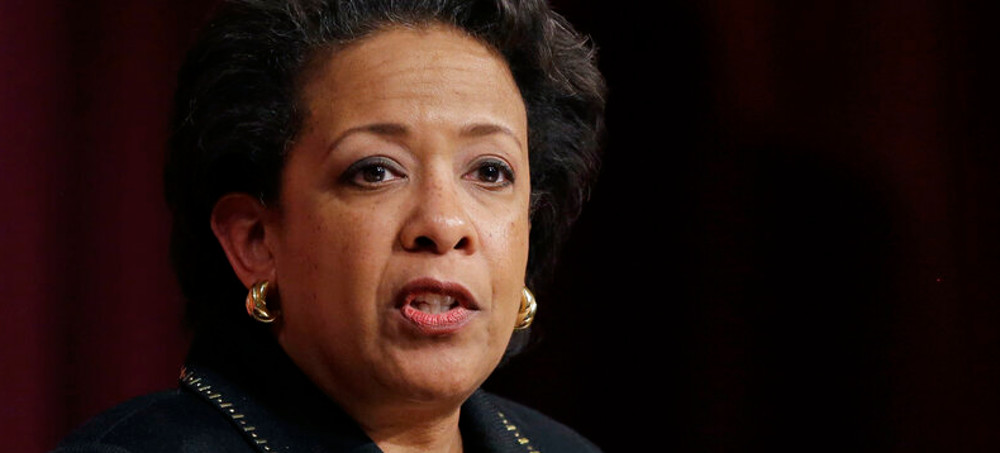 Former U.S. Attorney General Loretta Lynch. (photo: Elise Amendola/AP)
Former U.S. Attorney General Loretta Lynch. (photo: Elise Amendola/AP)
Sources told Bloomberg Law Wednesday that Lynch had been tapped to serve as counsel on the case in addition to Brad Karp, the chair of Paul, Weiss, Rifkind, Wharton … Garrison. Lynch is a partner in the New York-based firm's Washington, D.C., office.
In an emailed statement to NPR, NFL spokesperson Brian McCarthy confirmed the league's hiring of Lynch — saying that both she and Brad Karp will lead the defense.
"The league retained the Paul Weiss firm to represent the league and named clubs," McCarthy said.
Flores' suit also names the Denver Broncos, New York Giants and the Dolphins along with the NFL as defendants.
Before joining Paul Weiss in 2019, Lynch ran the Department of Justice under the Obama administration for two years.
The former attorney general was tapped in 2020 by the NFL to work on an inquiry into claims of workplace misconduct involving the then-Washington Football Team.
The NFL and the Paul Weiss law firm have had a longstanding relationship since 2007, as the firm is responsible for 25% of all cases involving the league in federal courts, according to data from Bloomberg Law.
Additionally, Karp has handled the NFL's concussion and benefits litigation. Karp currently leads the Wall Street firm, which according to reports, is amongst the most profitable in the U.S.
Earlier this month, Flores filed a 58-page class-action lawsuit against the NFL and the three teams for alleged racial discrimination.
Flores, who has more than a decade of coaching experience in the NFL, was fired as the Dolphins' head coach in early January after three years despite having signed a five-year contract with the team, according to the Pro Football Network. Flores charges that race was at the center of his removal from his position with the Dolphins, a problem that he says is endemic in the NFL.
In response, the NFL released a statement saying it will defend "against these claims, which are without merit."
"The NFL and our clubs are deeply committed to ensuring equitable employment practices and continue to make progress in providing equitable opportunities throughout our organizations," the NFL said.
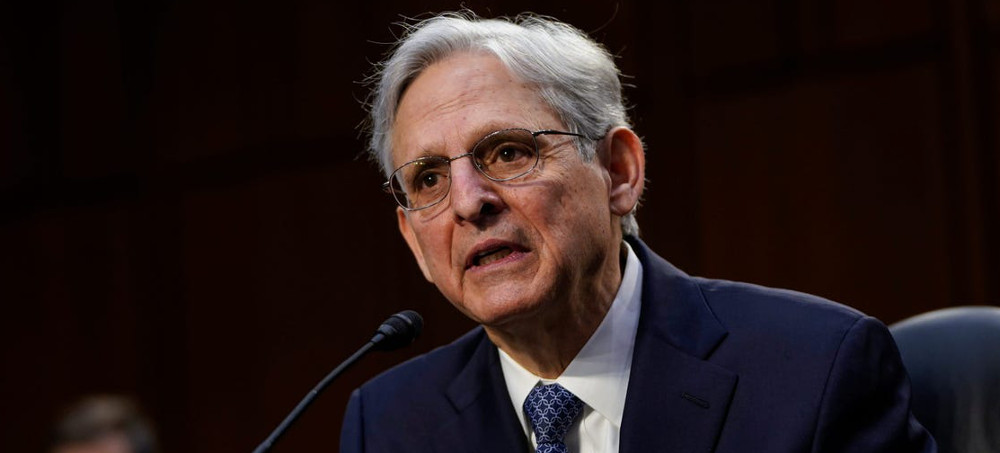 Attorney General Merrick Garland. (photo: Win McNamee/Getty)
Attorney General Merrick Garland. (photo: Win McNamee/Getty)
The Biden administration's lawsuit challenges the Missouri law, known as "Second Amendment Protection Act", which declares federal gun laws as "invalid" and threatens local officers and their agencies with fines of up to $50,000 if they assist in their enforcement. The measure was signed into law nearly a year ago by GOP Gov. Mike Parson.
“This act impedes criminal law enforcement operations in Missouri,” Attorney General Merrick B. Garland said. “The United States will work to ensure that our state and local law enforcement partners are not penalized for doing their jobs to keep our communities safe.”
Brian Boyton, chief of the Justice Department's Civil Division, said states "cannot simply declare federal laws invalid."
“This act makes enforcement of federal firearms laws difficult and strains the important law enforcement partnerships that help keep violent criminals off the street," Boyton said.
Federal officials claimed that since the law was enacted in June 2021, "dozens of state and local officers have resigned from federal joint-task forces" assisting in the enforcement of federal firearms offenses.
"In addition to penalizing individuals for working on joint federal-state law enforcement task forces, the (Missouri) statute penalizes current federal employees by barring them from state employment if they enforced the purportedly invalid laws," the federal complaint states.
Missouri Attorney General Eric Schmitt cast the Justice action as a "partisan lawsuit" that attempts to undercut gun rights.
"Unfortunately, the Biden DOJ has used this lawsuit as a pretext for them to pull the plug on our successful and innovative federal-state crime fighting partnership, the Safer Streets Initiative," Schmitt said in a written statement, adding that state authorities charged nearly 400 suspects.
"Time and again, the Biden Administration has put partisan politics ahead of public safety. Make no mistake, the law is on our side in this case, and I intend to beat the Biden Administration in court once again," the attorney general said.
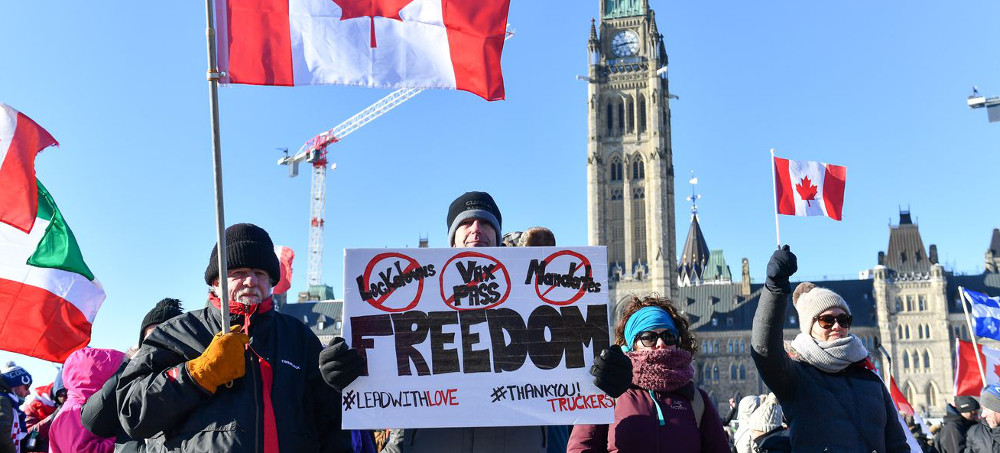 A protester holds up a sign condemning Canada's vaccine mandates and supporting the truckers' protest. (photo: Minas Panagiotakis/Getty Images)
A protester holds up a sign condemning Canada's vaccine mandates and supporting the truckers' protest. (photo: Minas Panagiotakis/Getty Images)
Public safety minister speaks after arrest of extremists accused of plotting to kill police officers in Canada border town of Coutts
“Several of the individuals at Coutts have strong ties to a far-right extreme organization with leaders who are in Ottawa,” the minister, Marco Medicino, told reporters on Wednesday.
The arrests on Monday came as police cleared a blockade at the border – one of a string of such protests mounted in support of the so-called freedom convoy occupation of Ottawa.
Police seized more than a dozen handguns and rifles, a cache of ammunition and body armour. Four of the arrested men are now accused of plotting to kill a number of Royal Canadian Mounted Police officers and civilians.
Medicino’s comments are likely to further stoke fears that extremist elements are present in a nationwide spate of unrest which began as a protest against Covid-19 health mandates but has embraced a broad range of anti-government grievances.
The minister did not name the extremist group linked to the Coutts arrest, saying only “we are talking about a group that is organized, agile, knowledgeable and driven by an extremist ideology where might makes right.”
But pictures after the arrests in Coutts show that some of the tactical equipment bore a flag with a white strip running diagonally across a black background.
Extremist researchers Anti-Hate Canada said the symbol is the flag of a satirical country of Diagolon – and the emblem of a “neo-fascist” and militia movement of the same name. The group has not been linked to any violence, but the researchers say that a string of meetings where members have posed with firearms indicate that it is becoming “a militia network”.
On the organization’s channel on the secure messaging app Telegram, members have in recent days cheered on the Coutts and Ottawa protests and shared images of prime minister Justin Trudeau’s head on a pyke.
Anti-extremist researchers say that the group’s leader is a prominent far-right activist named Jeremy MacKenzie, a veteran of the war in Afghanistan who served in a Canadian Armed Forces infantry unit.
Last April, he told viewers on a livestream: “Let’s just go to Parliament Hill and burn it down.”
MacKenzie was arrested in late January on weapons charges in his home province in Nova Scotia and released awaiting trial. He lamented on his livestream that “all of my legally acquired and possessed firearms are now in the possession of the state”.
Not long after his release in late January, MacKenzie headed to Ottawa, where scores of trucks and other vehicles have blockaded the centre of the city for weeks. There is no suggestion that Mackenzie is connected to the arrests in Coutts.
After the Trudeau government invoked emergency powers in an effort to end the protest, MacKenzie hosted a livestream on Monday where he insisted: “Nobody’s going anywhere. You’re not scaring anybody. You want to fucking dance? Let’s dance.”
“I was ready to die in Afghanistan for a cause I didn’t even fucking believe in or care about. I care very much about this one,” he said.
Peter Smith, a researcher with Anti-Hate Canada, said the introduction of new federal emergency powers has heightened the paranoia among the entire occupation. “What separates these extremist elements from others within the larger protest movement writ large is the emphasis on the inevitability or necessity of violence as a solution,” he said.
Protesters and protest organizers in Ottawa have repeatedly disavowed violence and insisted that their protest is about peaceful civil disobedience.
But police and emergency response sources in Ottawa say the authorities are concerned that some protestors in the city may possess firearms, and some elements of the movement appear to see the occupation as the possible trigger for broader unrest.
“What we’re beginning to see emerge now are the hallmarks of a sophisticated and capable organization of a small number of individuals, but with a steel resolve, driven by an extreme ideology that would seek to create to overthrow the existing government,” Medicino said.
The anti-vaccine group Hold Fast, which is present in Ottawa, posted to Facebook: “I smell civil war coming to Canada.” On Zello, the semi-official digital radio app of the occupiers, one prolific user commented: “I think we’ve got to lynch more than Trudeau. I think the peaceful protest is going to have to start changing.”
The leader of Canada First, a far-right and antisemitic group that has been visible at the occupation, recently warned that “Trudeau cannot stop what is inevitable.”
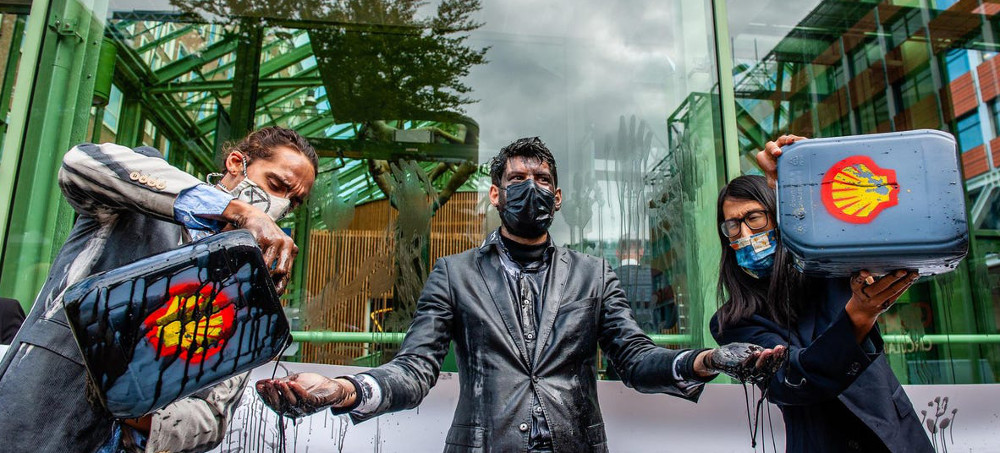 Climate activists wearing suits soaked in fake oil protest Shell by leaving handprints on the facade of the Ministry of Economic Affairs and Climate Policy building in The Hague, Netherlands. (photo: Getty)
Climate activists wearing suits soaked in fake oil protest Shell by leaving handprints on the facade of the Ministry of Economic Affairs and Climate Policy building in The Hague, Netherlands. (photo: Getty)
The study, published Wednesday in the journal PLOS One, found that Chevron, ExxonMobil, BP and Shell used terms like "climate," "low-carbon" and "transition" more frequently in recent annual reports and devised strategies around decarbonization. But their actions on clean energy were mostly pledges and the companies remain financially reliant on fossil fuels.
"We thus conclude that the transition to clean energy business models is not occurring, since the magnitude of investments and actions does not match discourse," the researchers at Tohoku University and Kyoto University in Japan said.
"Until actions and investment behavior are brought into alignment with discourse, accusations of greenwashing appear well-founded," they added.
The four major oil companies the study focuses on account for more than 10% of global carbon emissions since 1965, the researchers said.
Global energy companies have been promising a transition to clean energy – or at least reducing their carbon footprint – as pressure grows from environmental advocates, shareholders and governments to reduce greenhouse gas emissions in order to stave off the worst effects of climate change.
The companies have taken particular heat from critics who say they misled the public about the dangers of climate change for years and are now doing too little to address the warming planet.
Still, the energy sector isn't unified in how exactly to achieve that goal, and the study concludes that the world's largest publicly traded oil and gas companies are underperforming on their clean energy targets.
The paper found scant evidence of a major shift away from fossil fuels
Using data collected from 2009–2020, the researchers found that the companies often talked about shifting to clean energy without making dramatic changes that would enable them to make a company-wide transition.
For example, the paper said BP and Shell have vowed to reduce investments in fossil fuel extraction projects. Instead, they have increased acreage for new oil and gas exploration in recent years.
The researchers said they found no evidence that the companies were investing in clean energy at a scale that would allow them to shift away from fossil fuels.
In fact, the study noted: "Glaringly, ExxonMobil generated no clean energy during the decade." BP's global renewables capacity — the largest among the four majors — amounts to only 2,000 MW, or the the equivalent of about two large gas-fired power plants.
Also, the two European companies — BP and Shell — more consistently acknowledged climate science, invested more on clean energy and took more aggressive steps than their American counterparts — ExxonMobil and Chevron — which "exhibit defensive attitudes" toward investing in renewable energy and moving away from fossil fuels, the paper found.
The companies say they're moving toward clean energy
A spokesperson for Chevron, based in San Ramon, Calif., said the company couldn't comment directly on the paper because they hadn't seen it, but that Chevron is focused on "lowering the carbon intensity in our operations and seeking to grow lower carbon businesses along with our traditional business lines." Chevron is planning to put $10 billion into lower carbon investments by 2028.
BP, headquartered in London, said through a spokesperson that because the company made major advancements toward its net zero goals in 2021, it doesn't believe the paper fully accounts for its progress. For example, the company said it made $1.6 billion in capital investments in low carbon energy last year. BP also reported that its oil and gas production declined during the period the researchers studied.
"We have already made important strategic progress – for example, quadrupling our renewables pipeline and almost doubling our EV charge points since 2019 – and have recently further defined and evolved both our strategy and net zero ambition," the BP spokesperson said. The study said BP stood out for "increasing the proportion of investments in non-fossil fuel businesses and gradually reducing hydrocarbon production ... and exploration."
A Shell spokesperson said the company, also headquartered in London, is aiming to have net-zero emissions by 2050 – including both the energy it uses and sells – and that it was the first energy company to submit its transition plan to shareholders, who approved it.
ExxonMobil said it expects oil and gas production to be more or less flat through 2025, a spokesperson said. The firm, based in Irving, Texas, has also vowed to make $15 billion worth of lower-emission investments through 2027 and has "progressed more than 20 lower-emissions projects around the world."
Follow us on facebook and twitter!
PO Box 2043 / Citrus Heights, CA 95611



No comments:
Post a Comment
Note: Only a member of this blog may post a comment.